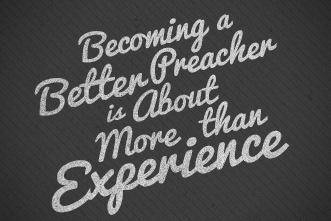“Pastor, your preaching just keeps getting better all the time.” I recently celebrated five years as my church’s pastor (I’ve been pastoring for over 20 years), and I’ve been hearing this statement a lot lately. I mean, I’ve been hearing it A LOT. In fact, I’ve been hearing this sentiment so much that I have begun to wonder what is going on. Why do people keep telling me this? What is it about my preaching that they see has improved? Am I really doing anything differently?
So, in addition to pondering these things, I started asking questions. At times, when people tell me how much better I am than I used to be, I ask, “Why? What makes you say that?” The answer I get most frequently? “I don’t know. You’re just getting better.” (And they usually feel obligated to explain that they always thought I was a good preacher, but now I’m even better.)
After much talking, ruminating and self-examination, I have drawn three conclusions as to why people believe my preaching is improving:
First, maybe my preaching is really getting better. I hope it is. I work on it. I read vast amounts of material on preaching. I listen to preachers I respect. I watch and listen to my own sermons with very critical eyes and ears. And I regularly ask for feedback from people I respect and who love me enough to be honest with me about what I’m doing right and what I could do better. My goal is to become a better preacher, and since I am very intentional about achieving that goal, my hope and expectation is that I will continue improving until Jesus calls me home. However, I think there is more to the story …
Second, I have come to know my congregation. I have been here for five years, and in that time, I have shared joys, sorrows and the mundane things of everyday life with them. I have learned who they are and how they think, and I have been able to place my finger on the pulse of their spiritual health. I have also studied and learned my culture—the prevalent beliefs and worldviews around me. Because I have gotten to know “my people” (yes, I know they are God’s people, but He has entrusted them to me, and I don’t take that lightly), I have learned how to communicate to them. I have learned what needs to be said and how to say it.
This also means that I plan my preaching and write my sermons with a particular people in mind. After all, preaching is more than simply imparting information. It contains an interactive dynamic that connects preacher with hearer. When I preach on Sunday mornings, I am bringing God’s Word to that group of God’s people that I have come to know and to love. I comfort them in their pain, rebuke them in their sin and encourage them in their success. And I do so, not as a stranger, but as their shepherd who loves them.
Third, they have come to know and love me. Really, this might even be more significant than the other two factors. I am blessed to serve a church that truly loves, respects and appreciates me. And while those feelings were somewhat present at the beginning of my ministry, they have grown tremendously over the last five years. I know that when I step into the pulpit week after week, I am addressing people who love me and want to hear what I have to say. When I misspeak (which happens), they overlook the mistake, and when a sermon might not be the best I’ve ever preached, they give me the benefit of the doubt and come back again the next week. Because these precious people love me, they are quick to forgive, and they look for the best in me.
So, am I really becoming a better preacher? I hope so, and I hope I never quit trying to improve. Nevertheless, when someone tells me how much better I’m getting, what I hear more than anything is an expression of appreciation from a person who loves a shepherd who loves his flock. And should God grant me the grace of remaining here for the long haul, I might just become the preacher I’ve always aspired to be.













